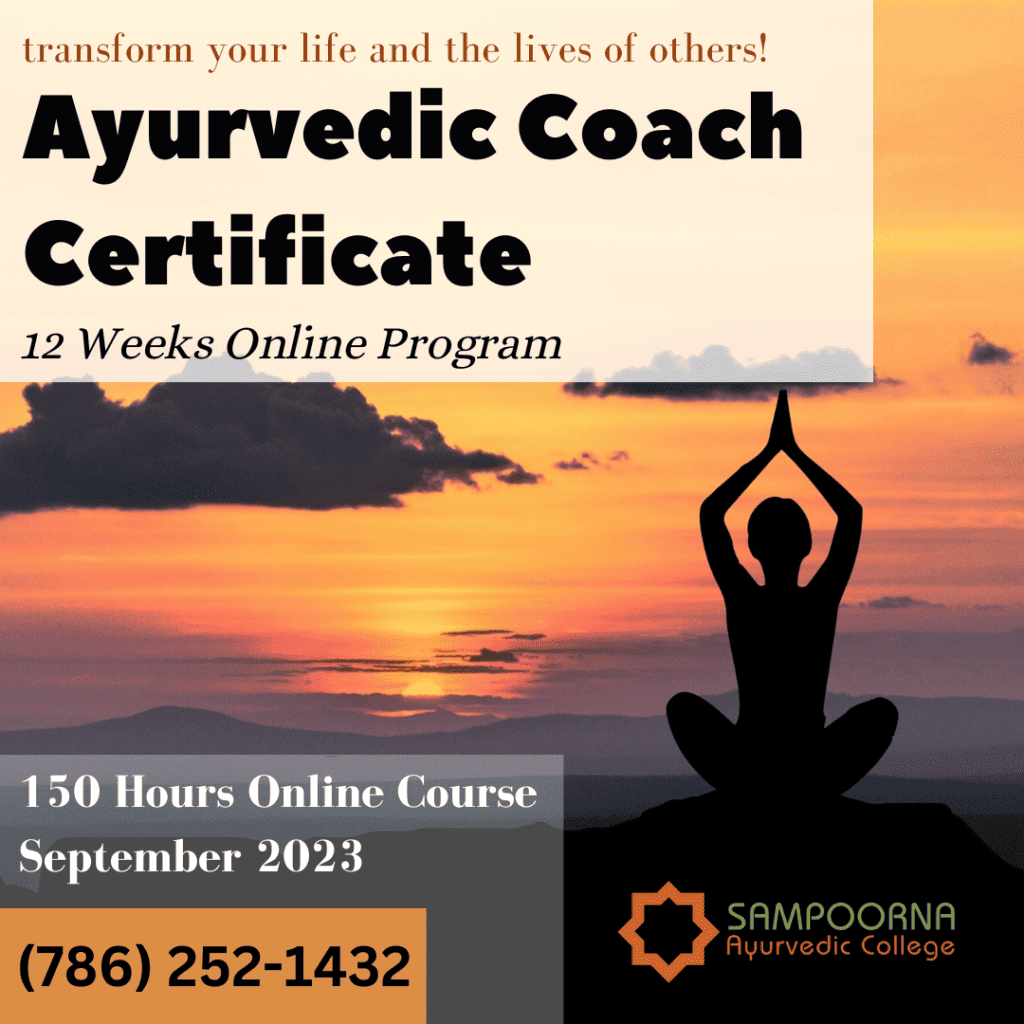The dawn’s golden hues softly illuminate the room as you finish your morning yoga routine, feeling more connected to yourself than ever. This is a snippet of the transformative journey of Ayurveda, an ancient science of life that has found a second home in the Sunshine State of Florida.
With a 17% increase in demand for Ayurvedic practitioners in the US over the past decade, this holistic health system is resonating with the wellness-focused ethos of modern society.
As an aspiring Ayurvedic practitioner, you’re not just choosing a career – you’re adopting a lifestyle. However, navigating the sea of Ayurvedic schools can be a daunting task. That’s why understanding Ayurveda certifications and picking the right school like Sampoorna Ayurvedic College becomes crucial.
This blog will guide you through this critical process to launch your Ayurvedic journey in Florida.
What is an Ayurveda Certification?
A certification in Ayurveda signifies that an individual has undergone specialized training in this ancient health and wellness system. It verifies that the individual possesses a deep understanding of the principles and practices of Ayurveda and can apply them in a professional setting.
There are different levels of Ayurveda certification, each with distinct requirements and areas of focus. The basic training in Ayurveda in the US is two years; AHC and AP.

Ayurvedic Health Counselor (AHC)
This entry-level certification typically covers the foundational principles of Ayurveda, basic assessment techniques, and lifestyle recommendations for health and balance. As an AHC, you can offer Ayurvedic counseling and guidance on diet, exercise, daily and seasonal routines, and stress management.
Ayurvedic Practitioner (AP)
An AP certification requires more in-depth training and clinical experience. APs can assess imbalances using advanced techniques and design personalized treatment plans that may include diet, lifestyle, herbs, Ayurvedic bodywork therapies, and more.
Although some schools offer the Ayurveda Doctor diploma, this training level requires extensive study and clinical experience. Standardization is required to properly offer this level of training since there is a need for a laboratory and other means.
At present, Ayurveda is not recognized as a medical profession in the US, and there is no organization with this regulatory power as of now. Using the title physician or doctor is a felony and should be avoided.

AHC and AP programs are considered the foundation and basics of Ayurvedic medicine. Further studies are required to fully understand all physiological responses about Doshas, treat difficult conditions, and perform more specialized procedures such as proper Panchakarma.
Earning a certification is a serious commitment to mastering the art and science of Ayurveda. It’s not merely about gaining knowledge but developing the skills and wisdom to foster health and well-being in oneself and others. It’s the gold standard in proving your qualifications and skills as an Ayurvedic professional.
Value of Certification in Ayurveda
Certification is a beacon of credibility and professionalism in a rapidly expanding field like Ayurveda. Here’s why an Ayurveda certification holds immense value:
Professional Credibility
A certification establishes you as a knowledgeable and competent professional in Ayurveda. It validates that you have met recognized standards in Ayurvedic education and practice.
Client Trust
Clients are increasingly savvy about their health and wellness choices. They seek professionals with reputable certifications, which assure the practitioner’s competence and commitment to their field.
Career Opportunities
An Ayurveda certification opens doors to various professional opportunities. Certified professionals can work in wellness centers and yoga studios or start a private practice. In addition, some practitioners integrate Ayurveda into related careers like nursing, nutrition, and psychotherapy.
Continued Learning
The journey of learning in Ayurveda doesn’t stop with certification. Most certifications require ongoing professional development, ensuring you stay updated with the latest research and practices in Ayurveda.
Community and Networking
Certified Ayurvedic professionals often have access to a supportive network of fellow practitioners and experts, facilitating collaboration, shared learning, and professional growth.
Choosing the Right Ayurveda School in Florida
Florida, known for its diverse natural beauty, vibrant communities, and wellness-focused lifestyle, has become a hub for Ayurveda. However, choosing the right Ayurveda school can seem daunting, given the many options available. Here are some crucial factors to consider:
Accreditation
Is the school accredited by a trusted organization like the National Ayurvedic Medical Association (NAMA) Accreditation assures that the school meets established quality standards and that its certifications are recognized?
Keep in mind that although there are a few organizations taking steps for Ayurveda to be standardized in the U.S, NAMA being the pioneer, there is no regulatory body at the moment to state laws nor regulations.
Curriculum
Does the curriculum cover essential topics, such as Ayurvedic philosophy, anatomy, physiology, pathology, diagnosis, treatments, and herbal medicine? For higher-level certifications, does it offer clinical training?
Faculty
The quality of teaching significantly influences your learning experience. Look for schools with experienced, knowledgeable, and approachable faculty who are experts in Ayurveda and excel in imparting this knowledge.
Check the most expert faculty of Sampoorna Ayurvedic College.
Location and Facilities
Be aware of schools out of the State, advertising as a Florida school on search engines like Google and others.
Considering you will be spending significant time at the school, choose a location that resonates with you. The school should provide a conducive learning environment and the necessary resources for practical training.
Ask to attend a class, speak to graduates, or have a physical meeting at the school or via Zoom with the Director of the admission department is crucial in making an informed decision.
Cost and Financial Aid
Compare the cost of programs and consider your financial capacity. Some schools offer scholarships, work-study opportunities, or payment plans to help make education more affordable. Most schools don’t offer financial aid due to the fact that Ayurveda is not yet standardized as a medical profession.

Career Goals and Aspirations
Finally, the school must align with your career goals and aspirations in Ayurveda. Do you want to become a counselor or practitioner, or simply have some foundation in Ayurveda? Does the school offer programs that correspond to your desired certification level?
Ayurveda Certification Process in Florida
Acquiring an Ayurveda certification in Florida (or any other state) involves rigorous training and assessment. While the specific procedures may vary slightly depending on the Ayurvedic school and the level of certification, the general process is as follows:
Education
The first step is to complete an educational program in Ayurveda at a recognized school. Depending on your desired level of certification, you’ll need to complete between 600 and 1500 hours of training, depending on the program. This training typically involves classroom instruction, self-study, and practical experience.
Examination
Once you’ve completed your education, you’ll typically need to pass an exam to prove your knowledge and competence in Ayurveda. The exam covers many topics, including Ayurvedic principles, assessment techniques, and therapeutic strategies.
Clinical Experience
For higher levels of certification, you’ll also need to complete a certain number of hours of supervised clinical experience. This provides you with hands-on practice in applying Ayurvedic principles and therapies under the guidance of an experienced professional.
Continuing Education
To maintain your certification, you must continue professional development. This ensures that you stay up-to-date with the latest developments in the field of Ayurveda.
Conclusion
An Ayurvedic certification is a tangible testament to your commitment to holistic wellness, professional growth, and service to others.
With its vibrant Ayurvedic community and excellent schools, Florida offers fertile ground for this enriching journey. Selecting the right school is a personal decision that shapes your Ayurvedic career and journey.
While factors such as accreditation, curriculum, faculty, and location matter, what’s equally important is that the school aligns with your career aspirations and resonates with your ethos. Embrace this transformative path, and let Ayurveda’s wisdom enrich your life and those you touch.




